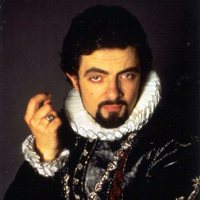
Edmund Blackadder
CBUB Wins: 0
CBUB Losses: 1
CBUB Ties: 0
Win Percentage: 0%
Added by: lemming
Edmund Blackadder is the single name given to a collection of fictional characters who appear in the BBC mock-historical comedy series Blackadder, each played by Rowan Atkinson. Although each series is set within a different period of British history, each character is part of the same familial dynasty and is usually called Edmund Blackadder. Each character also shares notable personality traits and characteristics throughout each incarnation; while each individual incarnation may be found in different circumstances, they are usually considered to be the same character.
Although each Blackadder is positioned in a different place in British society over each series, generally falling in class over the centuries, there are certain common characteristics that each Blackadder shares. Throughout each series, Blackadder is a self-serving, cynical opportunist concerned solely with increasing his own influence and status within his society (and, usually, gaining a lot of money and sex along the way) rather than serving any idealistic goals.
With the exception of the first Blackadder incarnation, Prince Edmund, each Blackadder is generally witty, charming and intelligent. While he is beset by bad luck, he is usually very capable of manipulating his way out of a crisis and in securing for himself some degree of prestige and fortune. Blackadder is also usually one of the few intelligent people present at any given time and usually is surrounded by incompetent, stupid and at times mad servants, equals and superiors. As a result, he possesses a scathing wit and is usually prepared with numerous sarcastic put-downs, which are often wasted on those they are directed at. He always has an amusingly exaggerated simile to describe whatever situation he finds himself in.
He is frequently present at some of the defining moments of British history, but usually views his contemporaries with unbridled contempt, regardless of their historical importance or interest. In particular, he tends to comment sardonically on what might, to modern eyes, be considered the more ludicrous follies of history (from the injustice of the medieval witchhunts, to the petty whims and stupidities of various British monarchs, to the pointless butchery of World War I). As a result, he is something of a modern perspective placed in past societies. He is also generally dismissive of the contemporary arts and culture in the various eras in which he lives, such as medieval folk pageants, Shakespeare, Georgian Romanticist poetry and Charlie Chaplin movies.
CBUB Match Record:
| Result | Opponent | My Score | Their Score | |
|---|---|---|---|---|
| Loss | Lt. Columbo | 40 | to | 45 |
No Fantasy Draft Records Available
